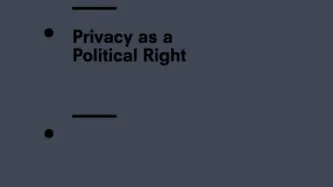Search
Content type: News & Analysis
The long-awaited release by Microsoft today of data about the number of law enforcement requests received and complied with by the company represents an important step forward in the ongoing challenge of understanding the scale of government access to communications information.
The data, the first set released by Microsoft, reveals that it received 70,665 requests for communications content and data in 2012, pertaining to 122,015 users or accounts. Communciations data was disclosed…
Content type: News & Analysis
We are the raw material of the new economy. Data about all of us is being prospected for, mined, refined and traded...and most of us don’t even know about it.
Every time we go online, we add to a personal digital footprint that’s interconnected across multiple service providers, and enrich massive caches of personal data that identify us, whether we have explicitly authenticated or not.
That may make you feel somewhat uneasy. It's pretty hard to manage your digital footprint if you can't even…
Content type: News & Analysis
Privacy International asked lawyers, activists, researchers and hackers at Defcon 2012 about some of the debates that thrive at the intersection between law, technology and privacy. We also wanted to know why privacy matters to them, and what they thought the future of privacy looked like. This video is a result of those conversations.
Featuring Cory Doctorow, Kade Crockford, Jameel Jaffer, Dan Kaminsky, Chris Soghoian, Marcia Hoffman, Moxie Marlinspike, Phil Zimmerman, Hanni Fakhoury…
Content type: News & Analysis
Anonymous proxy service HideMyAss.com - "a leading online privacy website" according to its own homepage - today admitted handing over user logs to law enforcement agencies.
We commend companies running privacy-protecting services. We need more like them. But we also need them to keep their word. Their website claims "Our free web proxy is a secure service that allows you to surf anonymously online in complete privacy" and their pro paid-for version promises that users can "…
Content type: News & Analysis
Governments have no automatic right of access to our communications. This will sound highly controversial to some, even downright radical. But the demands of national security and crime prevention do not, in fact, immediately trump every other right and responsibility in the complex relationship between citizen and state.
The recent Skype argument is a great example. Skype has always prided itself on being a secure method of communication. Businesses, government agencies, human…
Content type: News & Analysis
In Homer’s Iliad, the gods Juno and Saturn have great desire for each other, and Saturn wishes to lie with Juno on the top of Mount Ida. Juno protests Saturn’s advances, exclaiming: “What if one of the ever-living gods should see us sleeping together, and tell the others? It would be such a scandal that when I had risen from your embraces I could never show myself inside your house again”. Luckily for Saturn, Juno knows of a place with “good strong doors” where they can meet secretly and…
Content type: Report
When we think of privacy in the political system we tend to recall historic events
like Watergate, secret files held by governments in war-time, and blacklists. Modern political surveillance is more advanced and sophisticated. In this report we identify some of the modern political surveillance initiatives by governments around the world. We must recognise that all political systems require privacy to function, and devise our policies and build our technologies accordingly.
Content type: News & Analysis
Last year, Index on Censorship published an interview with Google’s chief legal officer and senior vice president David Drummond. The company was still reeling from the aftermath of the news that an attack had been launched on Gmail from China. Drummond proposed that free speech needed to be part of the international agenda at multilateral and bilateral trade discussions, just like piracy. 'Western governments whose economies certainly benefit from the internet sector should make this happen,'…
Content type: News & Analysis
Not since the 1990s has the internet been so exciting. With its use by political activists and journalists around the world, we can now again entertain the discussions that the internet brings freedom. Digital data traverses routers with little regard to national boundaries and so traditional constraints not longer apply. So it is no surprise that protestors on the streets of Tehran or Cairo are using the internet to organise. We like to believe in the freedom of the internet again, after…








